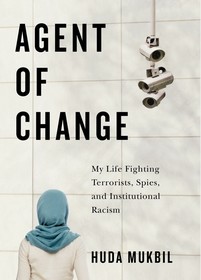
Agent of Change
My Life Fighting Terrorists, Spies, and Institutional Racism
- Publisher's listprice GBP 18.99
-
9 072 Ft (8 640 Ft + 5% VAT)
The price is estimated because at the time of ordering we do not know what conversion rates will apply to HUF / product currency when the book arrives. In case HUF is weaker, the price increases slightly, in case HUF is stronger, the price goes lower slightly.
- Discount 10% (cc. 907 Ft off)
- Discounted price 8 165 Ft (7 776 Ft + 5% VAT)
Subcribe now and take benefit of a favourable price.
Subscribe
9 072 Ft

Availability
Not yet published.
Why don't you give exact delivery time?
Delivery time is estimated on our previous experiences. We give estimations only, because we order from outside Hungary, and the delivery time mainly depends on how quickly the publisher supplies the book. Faster or slower deliveries both happen, but we do our best to supply as quickly as possible.
Product details:
- Publisher McGill-Queen's University Press
- Date of Publication 31 October 2025
- ISBN 9780228026433
- Binding Paperback
- No. of pages276 pages
- Size 229x152 mm
- Weight 666 g
- Language English
- Illustrations 19 photos 700
Categories
Long description:
In Agent of Change Huda Mukbil takes us behind the curtain of a leading spy agency during a fraught time, recounting her experiences as an intelligence officer for the Canadian Security Intelligence Service. Mukbil was the first Black Arab-Canadian Muslim woman to join CSIS and was at the forefront of the fight against terrorism after 9/11.
Mukbil's mastery of four languages quickly made her a counterterrorism expert and a uniquely valuable asset to the organization. But as she worked with colleagues to confront new international threats, she also struggled for acceptance and recognition at the agency. Following the American-led invasion of Iraq in 2003 and the rise of homegrown extremism, Mukbil was framed as an inside threat. Determined to prove her loyalty, while equally concerned about the surveillance and profiling of Muslims and revelations of Western agencies' torture and torture by proxy, Mukbil started to question CSIS's fluctuating ethical stance in relation to its mandate. Her stellar work on a secondment to MI5, the British Security Service, earned commendation; this shielded her, but only temporarily, from the hostile workplace culture at CSIS. Ultimately, Mukbil and a group of colleagues went public about the pervasive institutional discrimination undermining CSIS and national security from within.
Mukbil's expertise in international security and her commitment to workplace transparency drove important changes at CSIS. Dazzlingly written, her account is an eye-opener for anyone wanting to understand how racism, misogyny, and Islamophobia undermine not only individuals, but institutions and the national interest – and how addressing this openly can tackle populism and misinformation.







